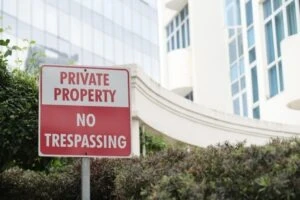
Certain actions under the constitution are covered by California Penal Code Section 602.1: Interfering or Obstructing a Public Business Establishment. The U.S. Constitution sets out certain protected rights for U.S. citizens, including rights related to freedom of speech and freedom of assembly, but some people may be facing unfair charges.
Individuals can face criminal charges depending on how they assemble around a business. Understanding California’s Penal Code on the limits of your legally protected rights can help you determine if you are interfering with or obstructing a public business establishment. A Los Angeles criminal defense lawyer can help you go over the definition and penalties associated with PC 602.1; call us 24/7.
Defining PC 602.1 in Los Angeles
U.S. citizens are entitled to assemble together and to speak their minds freely. However, PC 602.1 sets some limits on assemblies in public. This law states that you may be charged with interfering or obstructing a public business establishment if you obstruct or intimidate business people or obstruct or intimidate customers
Blocking doors or directly approaching either customers or employees may be considered interfering with a public business establishment in Los Angeles. Individuals may also be charged under PC 602.1 if they refuse to leave a business after being asked by:
- The business owner
- An agent of the business owner
- A peace officer (In California, a “peace officer” refers to a variety of law enforcement personnel who have specific legal authority granted under state law. Peace officers in California have powers to enforce the law, conduct arrests, and carry firearms, among other responsibilities.)
Individuals can only be charged with interfering or obstructing a public business if they cause trouble with lawful business transactions in establishments that are open to public traffic. Additionally, an individual must act intentionally in order to be convicted under PC 602.1.
For a free legal consultation with an interfering or obstructing a public business establishment lawyer serving California, call (310) 896-2723
What Must the Prosecution Prove to Convict You Under PC 602.1?
As with all crimes, the burden of proof lies with the prosecution. To convict a defendant of a crime under penal code 602.1, the prosecutor must prove three elements:
- They must be able to show that the defendant intentionally interfered with the operations of a public business establishment.
- They must show that this interference took the form of obstructing or intimidating customers or employees of the establishment.
- They must prove that the defendant refused to leave the premises of the public business establishment after receiving a request to do so by the business owner, their proxy, or a police officer.
California Interfering or Obstructing a Public Business Establishment Lawyer Near Me (310) 896-2723
Charges Related to PC 602.1 in Los Angeles
Individuals can face several other criminal charges that are similar to PC 602.1. Depending on your circumstances, you could also find yourself charged with:
- California Penal Code Section 408: Unlawful Assembly
- California Penal Code Section 602: Trespassing
- California Penal Code Section 601: Aggravated Trespassing
Trespassing is considered a property crime that can be charged as a misdemeanor or a felony. Individuals accused of interfering with a business may be charged with trespassing crime in addition to interfering or obstructing a public business establishment.
Click to contact our Understanding California’s Penal Code today
Examples of Interfering or Obstructing a Public Business Establishment
Interfering with or obstructing a public business establishment can take many forms, often resulting in disruptions to normal operations. Here are some examples of potential criminal offenses:
- Blocking entryways or exits: This includes blocking accessible property by physically standing in front of doors or pathways to prevent customers or employees from entering or leaving the premises.
- Trespassing: Trespassing is when an unauthorized person enters or remains on the business property without permission, especially after being asked to leave, which can lead to legal action and further disruptions. If you’ve accessed private property without permission, contact us to get more information about trespassing laws and different types of trespassing.
- Unauthorized demonstrations: This includes organizing or participating in protests inside a business, leading to disturbances and potential safety hazards.
- Vandalism: This includes damaging accessible property such as windows, furniture, or merchandise, which disrupts the business and creates a hostile environment. This may also include building fires where fires are not permitted.
- Loitering: This includes congregating in or around the business without any intent to shop or engage in legitimate activities, especially when it deters actual customers from entering.
- Harassing customers or staff: This includes engaging in aggressive behavior, verbal abuse, or intimidation tactics toward customers or employees, causing discomfort and deterring business.
- Disruptive Behavior: This includes acting in a loud, boisterous, or disorderly manner, which interferes with the normal flow of business and customer interactions.
- Obstructing transactions: This includes standing at counters or checkout lines to hinder transactions, causing delays and frustration for other customers.
- Unauthorized filming or photography: This includes recording inside the establishment without permission, potentially violating privacy policies and causing disturbances.
Such actions not only disrupt the operations of the business but can also lead to legal consequences for the individuals involved, including charges of trespassing or disorderly conduct. Contact our law firm for help against your charges; don’t wait. You have a limited period of time to fight your charges.
Trespassing on Public Property
Trespassing on public property in California involves entering or remaining on public lands or facilities without authorization or after being asked to leave. California Penal Code outlines a wide range of forms of trespassing, including refusing to leave a public building during regular hours when requested by an authorized official.
Public property can include parks, government buildings, and other publicly owned spaces. Trespassing crime charges can result in fines and potential jail time, depending on the severity and nature of the offense. This law aims to protect public resources and ensure the safety and accessibility of public spaces for all citizens.
Complete a Free Case Evaluation form now
Penalties for Interfering or Obstructing a Public Business Establishment
Individuals can face a number of harsh legal repercussions if they are convicted under PC 602.1. Interfering or obstructing a public business establishment is treated as a misdemeanor by the court system and can lead to penalties including up to 90 days of county jail time and fines of up to $400.
These penalties can be challenging to deal with for many people. You can get help building a defense against charges of interfering or obstructing a public business establishment by contacting a Los Angeles criminal defense attorney right away.
PC 602.1 Charges and Legal Defenses
Individuals do not just have to accept charges under PC 602.1. There are several legal defenses that can be used if you face charges for interfering or obstructing a public business establishment, such as:
- You were never asked to leave.
- You were staging a legal protest.
- You did not intend to interfere.
Don’t face days in jail; our legal defense lawyers may be able to fight your offense of trespassing or business obstruction.
You Were Never Asked to Leave
A lawful business owner, their agent, or a peace officer must ask you to leave before you can be charged under PC 602.1. If you did not refuse a request to leave a business, you should not be convicted of interfering or obstructing a public business establishment. Your protest does not become unlawful until you refuse to leave after a request to do so has been made.
You Were Staging a Legal Protest
The Constitution allows citizens of the U.S. to protest publicly and peacefully. As long as protesters do not block entrances or exits to a building or directly approach or intimidate customers or employees, they should not be convicted under PC 602.1. Note also that this charge does not apply to individuals who are taking part in lawful labor union actions.
You Did Not Intend to Interfere
An important violation of PC 602.1 that must be established in order to convict you of a crime is that you intended to interfere with the operations of a lawful business. If you were peacefully protesting and your actions inadvertently interfered with a customer or employee, you have not committed a crime. Simmrin Law Group can employ common defenses to fight against your legal issues with a business.
Exercise Your First Amendment Rights
Peaceful protests are an important legal right for all United States citizens. Knowing your rights and how far they extend is critical to protecting yourself. Don’t avoid voicing your opinion because you fear the repercussions.
Instead, educate yourself and protest freely with the knowledge of which actions are within your rights and which actions cross the line.
Get Professional Advice About PC 602.1 Charges
Individuals in California have the right to gather together and speak their minds. Sometimes, these gatherings may violate California Penal Code Section 602.1: Interfering or Obstructing a Public Business Establishment.
The Simmrin Law Group can help you handle violations of PC 602.1. Contact us today to learn more about private property, property rights, and other types of business activities when it comes to the legal realm. Keep in mind you have a time limitation when it comes to filing a claim.
Call or text (310) 896-2723 or complete a Free Case Evaluation form


